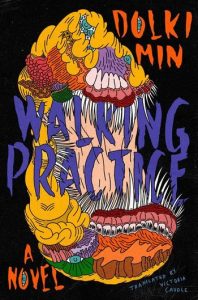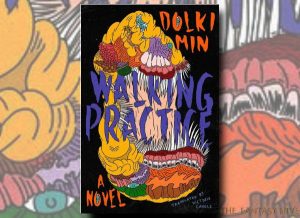WALKING PRACTICE by Dolki Min, translated by Victoria Caudle (BOOK REVIEW)
“I wasn’t raised as a life-form of limited imagination. But truthfully, on my home planet, no one could have imagined that there is something that walks around on two legs swinging its two arms. The idea of it must have been tossed around at some point, but we would be hard pressed to believe that bipedalism was really possible and that there really is a whole group of life-forms out there somewhere living on two legs. On my planet, we have no trouble balancing on four legs, or on three legs with one arm. After getting a leg cut off in an accident, just a few days’ rest will restore their number back to what it was before. While trying to live in this place, it feels like I am forced to amputate a leg and have a transplant surgery to make it into an arm. It kind of feels like I’m dough being pressed through a cookie cutter and baked till crisp.”
Dolki Min’s debut novel Walking Practice was published in South Korea in 2017, and now for the first time is being published in Victoria Caudle’s wonderful English translation by HarperVia. As soon as I saw the bizarre cover art and learned about the premise, I knew I had to read this book. And if anything, Min somehow has created a book that is even more strange, uncategorisable and brilliantly bonkers than promised. Told from the perspective of a shapeshifting alien that crash lands on Earth and seduces humans so they can then eat them, Walking Practice is hilarious and horrifying, a bracing exploration of nonhuman embodiment that uses the alien to show the labels, restrictions and difficulties our society places on bodies, especially those that are queer or disabled. Min’s remarkable novel is an impressive feat of speculative biological imagining, a compelling character piece that manages to draw empathy from the most unexpected situations, and a biting satire on the impossible body standards society expects one to conform to. Victoria Caudle’s translation does a wonderful job of capturing the linguistic and formal playfulness of Min’s writing.
 Walking Practice is told from the point of view of the shapeshifting alien, as they share their thoughts with the reader largely out of loneliness. The text is a consistent font while the alien is in one of their human shapes, but when they revert to their original form the text expands and contracts across the page, their alien mouthparts struggling with a language designed for human tongues. The text is peppered throughout with Min’s abstractified drawings of the alien, which suggest rather than explain their appearance. Min never lets us forget that we are not talking with a human. The alien is utterly charming, and even though they arrange hook ups so they can eat people post-coitus, it’s hard not to root for them. Min’s greatest trick is that they manage to make the alien so charismatic in a way that doesn’t detract from their sheer alieness. A lot of this is achieved through voice. The alien is very funny, and their wry observations about how the only thing more ridiculous than human bodies are humans themselves are a delight. For all that they prey on humans, they have an innate fascination with and enthusiasm for the human condition. This is born out of the empathy forced on them by having to take human shape and thus become aware of the human condition from the inside, as well as by the alien’s intense loneliness. Stranded on Earth after their home was destroyed by a violent interstellar conflict, they know they are the only one of their kind on the planet, and possibly the only one left in the universe. This gives their ruminations about loneliness and the difficulty of connecting a real pathos.
Walking Practice is told from the point of view of the shapeshifting alien, as they share their thoughts with the reader largely out of loneliness. The text is a consistent font while the alien is in one of their human shapes, but when they revert to their original form the text expands and contracts across the page, their alien mouthparts struggling with a language designed for human tongues. The text is peppered throughout with Min’s abstractified drawings of the alien, which suggest rather than explain their appearance. Min never lets us forget that we are not talking with a human. The alien is utterly charming, and even though they arrange hook ups so they can eat people post-coitus, it’s hard not to root for them. Min’s greatest trick is that they manage to make the alien so charismatic in a way that doesn’t detract from their sheer alieness. A lot of this is achieved through voice. The alien is very funny, and their wry observations about how the only thing more ridiculous than human bodies are humans themselves are a delight. For all that they prey on humans, they have an innate fascination with and enthusiasm for the human condition. This is born out of the empathy forced on them by having to take human shape and thus become aware of the human condition from the inside, as well as by the alien’s intense loneliness. Stranded on Earth after their home was destroyed by a violent interstellar conflict, they know they are the only one of their kind on the planet, and possibly the only one left in the universe. This gives their ruminations about loneliness and the difficulty of connecting a real pathos.
Walking Practice echoes Michel Faber’s excellent Under The Skin (2000), which is also about an alien who preys on humans finding themselves unexpectedly empathising with their human victims once they discover that humans are people too. Min’s alien similarly finds themselves questioning the morality of what they are doing, sympathising more and more with their human victims. Min engages much more explicitly with the inherent queerness of their alien than Faber does. The alien changes their gender, appearance and behaviour depending on the sexual preference of the human they are preying on. This allows the alien to comment on the constructed nature of human sexuality and the performative nature of gender, as they have had to learn how to imitate men and women and the various signs and behaviours that are construed as straight or queer by observing humans as an outsider. This can be seen in a sequence where the alien prepares to meet a date:
“I’ll be playing the part of a woman in her late twenties. Acting as a woman is far more intricate than acting as a man. Men can walk however they like, but a woman must walk like a woman. “However they like” means walking with their legs splayed and their shoulders shaking. “Like a woman” means turning your knees inward and jiggling your ass. I don’t need to spell it out for you… Those who know, know and execute it with their bodies. They put effort into the execution. They will often fail. They’ll be scared of failure. They’ll give up too. It’s actually hard to tell walking styles apart by gender. Cause it’s all in your head.”
The outsider perspective of the alien, for whom human embodiment is utterly unfamiliar, allows the novel to point out the inherent ridiculousness of gendered behaviours, whilst acknowledging our own anxieties about failing to correctly perform our own genders. In a similar way, the alien is also able to make pointed observations about ableism. With their body being adapted for lower gravity, walking on Earth is difficult for the alien before they force themselves into the uncomfortable and unfamiliar restricting shape they needs to in order to pass as human. As such, they are immediately aware of the ways in which cities and human habitations tend to be designed with able bodies in mind, from the hated staircases they have to climb in order to reach their preys’ flats to having to stand for hours on public transport with no chance of a seat. They are also very much aware of the hostile attention they draw when they fail to successfully imitate a “normal” human, and the way this contributes to body conformity:
“They can’t wait to ogle a monster. Without monsters, how would they withstand the unrelenting futility of their days?”
Walking Practice is an incredible achievement. Min strikes an unusual balance between humour and horror, making for a memorable and affecting reading experience. The novel shows us the alien in the human to make us understand the human in the alien, making powerful points about the ways in which society alienates those who are different. We are indebted to Victoria Caudle and HarperVia for bringing this incredible work of South Korean speculative fiction into English, and I very much look forward to whatever Min does next.
Walking Practice is out today, you can grab your copy HERE

